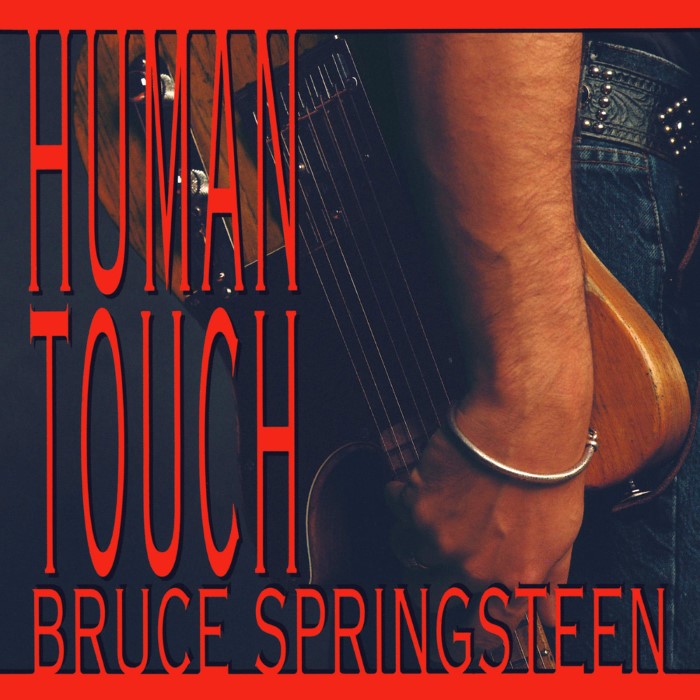Human Touch by Bruce Springsteen

Human Touch is the ninth studio album by Bruce Springsteen, released in 1992 (see 1992 in music). This album was co-released on the same day as Lucky Town. It was the more popular of the two, and it peaked at #2 on the Billboard 200, with "Human Touch" (paired with Lucky Town's "Better Days") peaking at #1 on the Album Rock Tracks chart and #16 on the Billboard Hot 100 chart. Human Touch's release was met with mixed critical reception, garnering him the most lukewarm critical reviews he had received in his career up to that point. Allmusic described the album as "generic pop" and "his first that didn't at least aspire to greatness." However, Rolling Stone gave the album a far more generous review, saying that its songs "explore the movement from disenchanted isolation to a willingness to risk love and its attendant traumas again." The review also stated that the title track "stands among Springsteen's best work." The album is generally disliked by Springsteen fans and was recently ranked last among his 17 albums by the website Nerve. Regarding the bad reputation of this record and Lucky Town among his fans Springsteen said: "I tried it in the early '90s and it didn't work; the public didn't like it."
After the release of 1987’s <i>Tunnel of Love</i>, Bruce Springsteen got divorced, married Patti Scialfa and left New Jersey for Los Angeles. He also broke up the E Street Band, at least temporarily. That gave Springsteen some space to figure out who he wanted to be in the next phase of his career—and what kind of music he wanted to make. The genesis for <i>Human Touch</i> came during a dinner with E Street Band keyboardist Roy Bittan, who told Springsteen he’d written some music on his new home multi-synthesiser rig. Springsteen asked if he could listen to a cassette featuring Bittan’s tracks—and the next day, the Boss phoned his long-time keyboardist, telling him he’d written a hit. Bittan would be the only E Street veteran to appear on 1992’s <i>Human Touch</i>, an album that embraced the smooth, processed synthesiser sound popular in the early 1990s, while also reaching back to the soul and R&B singers Springsteen had always idolised. The subject matter of the songs focused on Springsteen’s struggle to make his second marriage more successful than his first, but there were also quasi-confessional tracks—the result of Springsteen’s recent foray into therapy. The title track recounts the story of Bruce and Patti’s romance, “The Long Goodbye” explains why he’d left New Jersey and the bass-heavy “57 Channels (And Nothin’ On)” is a playful ode to Elvis via cable television. None of this happened quickly: Springsteen kept writing and recording songs, and blew past deadlines in his desire to create the exact right next record at this point in his career. <i>Human Touch</i> ended up being released on the same day as <i>Lucky Town</i>, thanks in part to Springsteen’s prolificness: When he went back to work on a single for <i>Human Touch</i>, Springsteen ended up also writing an entirely new batch of songs. Guns N’ Roses had just tried a two-at-once release pattern with the <i>Use Your Illusion</i> albums, and Springsteen and his manager felt the release of the singer’s first record since breaking up the E Street Band deserved similar fanfare.
